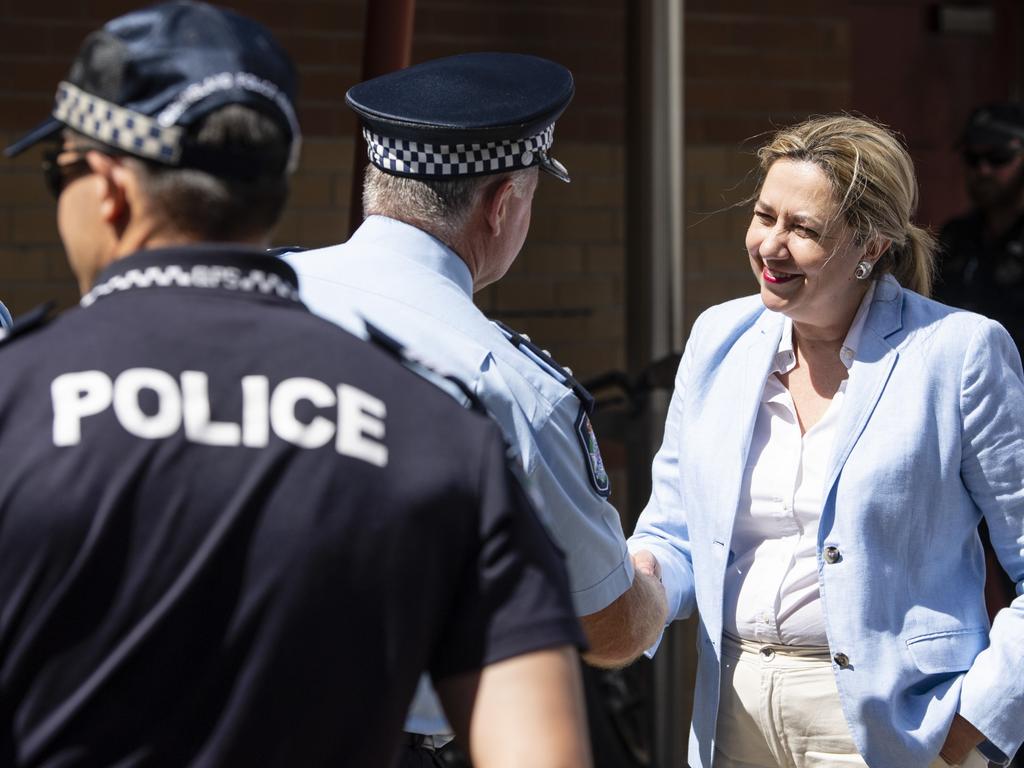Qld youth crime crisis: GPS trackers expanded despite lack of evidence they work
A report quietly released this week has failed to back Premier Annastacia Palaszczuk’s latest plan to tackle youth crime.
QLD News
Don't miss out on the headlines from QLD News. Followed categories will be added to My News.
The use of GPS trackers on young offenders will be expanded, Premier Annastacia Palaszczuk has announced, despite a report quietly released this week revealing a 16-month trial of the measure couldn’t establish if it worked.
Ms Palaszczuk – visiting Toowoomba for the first time in over a year as the city grapples with its own youth crime crisis – announced a suite of measures for the region to curb juvenile offending, including the expansion of the use of GPS trackers, intensive bail programs and “extreme” high-visibility police patrols.
It can be revealed a report evaluating the effectiveness of GPS trackers for children, undertaken by former police commissioner Bob Atkinson, was quietly released on the Department of Youth Justice website on Tuesday.
It confirmed the $3.8m program, which ran at seven sites across the state between May 2021 and September 2022, resulted in just eight young people being fitted with ankle monitors.
This means the number of public servants, at 12 full-time employees, eclipsed the ultimate size of the program.
While there were some benefits found, the report concluded there was no way to confirm the effectiveness of putting a GPS tracker on a child for reducing youth crime.
“There is insufficient evidence and data from this review or other comparable jurisdictions to make definitive, evidence-based conclusions about the efficacy of electronic monitoring as a bail condition within the Queensland youth justice context,” it said.

Ms Palaszczuk, asked about how many youths had actually been fitted with a tracker, said the report had recommended a broader section of people and that the measure had worked successfully elsewhere when coupled with other intensive bail measures.
She also put the onus back on the judiciary to implement the measure when asked why only a small number of children had been fitted with the tracker.
But the report noted only children with a stable address, access to a mobile phone and electricity, and parents willing to make sure they comply can be eligible among other criteria.
The state government this week introduced a suite of legislation to tackle youth crime, including lowering the age a child can be fitted with a tracker from 16 to 15.
Ms Palaszczuk copped flak for opting not to attend a youth crime forum in Toowoomba on February 15.
On Friday, at a press conference held in the back carpark of a Toowoomba police station, Ms Palaszczuk said she had spent the day meeting with stakeholders including victims of crime.
“Community safety is always my government’s priority,” she said.
“People in Toowoomba will see more police, more often, out in the streets patrolling shopping centres and other areas where people gather, and we have introduced breach of bail legislation that is real and will work.”
More Coverage
Originally published as Qld youth crime crisis: GPS trackers expanded despite lack of evidence they work









